Role of developmental propaganda in politics

Development refers to the overall improvement of people's quality of life. As such, the development of a country means safe food and water, affordable quality education and health care for all, adequate public transport, safe roads free from traffic jams and accidents, pollution-free environment, safety of life, adequate employment, proper labour rights, democracy, freedom of expression, etc. But it is interesting to note that when Bangladesh's ruling party claims that massive development is taking place in the country, instead of emphasising on the improvement of the quality of life, it usually shows examples of infrastructure development, and cites statistics of economic growth.
Infrastructural development is important for those in power because, on the one hand, it can be quickly and easily visualised and, on the other hand, it is easy to distribute rents to vested interest groups in the name of infrastructure contracts. It is not that these infrastructures are of no use to the people, but since these projects are taken up mostly for the purpose of exhibition and looting, in many cases these are executed using resources that would be better utilised in important sectors like education and healthcare. The risks toward the people and the environment are not taken into account for the sake of development, the projects are often rife with corruption and wastefulness due to the lack of transparency and accountability, and often they pose huge risks to the economy due to their reliance on foreign debts.
Many like to think that these infrastructural developments are only possible when there is long-term economic stability under an authoritarian regime. In reality, authoritarian regimes themselves need these kinds of visible development projects to gain legitimacy for their long-term survival. Conversely, the development of safe food and clean water supply systems are not easily visible, the tasks of building universal healthcare and non-discriminatory education systems are long-term and not easily visible and, above all, these initiatives are not business-friendly per se. To make the transport system pro-people, the transport mafia must be eliminated. If corruption and looting are to be stopped, the interests of the cronies will be undermined. If the rule of law is to be established, the ruling elites must judge themselves, which is impossible. Rather, it is easier and more profitable to build some infrastructure like in western developed countries and promote them as symbols of development and embed that idea into the minds of citizens through propaganda.
The additional benefit accrued by ruling elites through this type of infrastructure-based development model is that government spending on large infrastructure projects increases GDP on the one hand, and creates opportunities for corruption and looting for ruling elites on the other hand. But the problem is, there is a limit to the increase in GDP through such debt-dependent infrastructure projects. After a certain period when the economy no longer has the capacity to borrow more, when these costly infrastructure projects do not generate the advertised benefits, when the repayment of the loan in foreign currency becomes difficult, then these visible development projects, which were once used to compare the country to Bangkok, Singapore, Los Angeles, etc., appear as a burden for the whole economy.
The growth and crisis of Turkey's economy under the authoritarian leadership of Recep Tayyip Erdogan is a good example of the impact of such developmental propaganda. Turkey is currently in such an economic crisis that it makes global headlines on a regular basis. Last year, the Turkish lira lost more than 27 percent of its value against the dollar, inflation officially surpassed 80 percent (and unofficially 180 percent) and it only keeps rising as Erdogan refuses to let Turkey's central bank raise interest rates. But the situation was not always like this. Erdogan rose to power in 2002 on a promise to deliver economic prosperity, and became Turkey's longest-serving ruler thanks to the country's GDP tripling under his leadership. As researcher Aykut Ozturk explains, instrumentalisation of the national developmentalist narrative by Erdogan's authoritarian regime in Turkey was an important factor behind his long rule. This narrative has been characterised by the promise of meteoric economic development, the articulation of mega infrastructural projects as symbols of realising this promise, etc. This promise of economic development was spread among the masses using slogans like: "Turkey is ready, Target: 2023", "National Will, National Power, Target 2023," "New Turkey, New Power, Target 2023," etc. The year 2023 was carefully selected for its high symbolic and aesthetic significance, as it marks the centenary of the foundation of the Turkish Republic.

The mega construction projects on which the symbolic realisation of the developmental propaganda of the Erdogan regime relied on were two suspension bridges in Istanbul, a new airport in Istanbul, an artificial water leeway between the Marmara Sea and Black Sea, as well as two new "cities" in Istanbul. This became evident in the celebration of the Osmangazi Bridge construction – a suspension bridge built over the Gulf of Izmit which was one of the Justice and Development Party's (AKP) campaign promises in the 2011 election period. The construction of the bridge started in 2013 and was ceremoniously opened to services on June 30, 2016. Aykut Ozturk described how, on this occasion, TV channels made live broadcasts from the bridge throughout the entire week, dubbing June 30 as "a historic day" and "the day of pride". Driving over the bridge was free for everyone for the next seven days and many people living in cities around the bridge took this chance to have a "historic experience". They joined the celebrations, took photos, danced, recorded videos, and uploaded them to social media to share their excitement.
The megaprojects which were once showcased to justify authoritarianism in the name of economic development have become a burden for Turkey's economy. The projects enjoyed huge government incentives such as land allocation and loan guarantees as well as long-term service purchase and turnover guarantees for the contractors, which are mostly business groups close to the ruling AKP or foreign companies. Rather than investing in factories, which is the conventional way for an emerging economy to prosper, Turkey emphasised on construction-led development. As a result, since the late 1990s, manufacturing has shrunk from more than 22 percent of the economy to about 16 percent, while construction and real estate have grown swiftly and now account for about as large a share of national output as manufacturing. And these megaprojects were mainly funded by foreign currency loans which enjoy government financial guarantees. Now the problem is that Turkish companies are facing a mismatch between their debts and their revenue, because they borrowed in dollars while their customers pay them in lira. The severe deprecation of the Turkish lira in the past several years has gravely exacerbated the liabilities of both the contractors and the government, while pushing up service prices for consumers at facilities where such prices were denominated in dollars.
The same kind of infrastructure-based development discourse has been used for a long time to justify the current oppressive conditions in Bangladesh. That's why catchy slogans like "Vision 2021" or "Digital Bangladesh" have been used to create aspirations for development among the people. And the Padma Bridge, Metro Rail, Rooppur Nuclear Power Plant, Karnaphuli Tunnel, flyovers, four-lane highways, etc. have been shown as evidence of realisation of that dream. After analysing 20 such major projects, the Center for Policy Dialogue (CPD) warned that Bangladesh will be in for a big shock between 2024 and 2026 from the debt liabilities of the mega projects, as the time of foreign loan repayment is nearing. Around Tk 5,569.55 billion is being spent to implement these mega projects, and foreign loans compose of 62 percent of the total spending. During this time, annual instalment for Rooppur will be $565 million, $178 million for Padma Bridge Rail Link project, and $53 million for the Karnaphuli Tunnel. As revenue from these projects will be generated in the local currency, these additional debt servicing in dollar terms will increase pressure on our foreign reserves which already seem to be in continuous decline.
Because of the importance given to debt-funded infrastructure-based development, the country's economy is being burdened by increasing unsustainable foreign debt and import dependence – as it's becoming quite evident from the recent reserve crisis. On the other hand, the quality of people's life has deteriorated, and the disparity between the rich and the poor has increased.
As a result, in the midst of high GDP growth and with the country having the fastest growth of rich people, the share for the poor in the national income is decreasing, workers are not getting living wages and dying regularly in unsafe working conditions, migrant workers are returning home prematurely (oftentimes dead), unemployed youth are not getting dignified jobs and are dying on desperate journeys abroad, and citizens are not getting affordable quality education and health care. There is an epidemic of death on our expensively built highways that are under complete control of the transport mafia. The statistics of growth and development cannot guarantee clean water, safe food and protection of our environment. The air quality in the country, water supply and sanitation, biodiversity, forestry and rivers are all deteriorating day by day.
To overcome this situation, we have to challenge the discourse of development set by the ruling class. The criteria of development created by them should be rejected, and the concept of the overall improvement of the quality of peoples' lives should be adopted in the development narrative.
Kallol Mustafa is an engineer and writer who focuses on power, energy, environment and development economics.
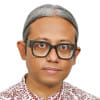
 For all latest news, follow The Daily Star's Google News channel.
For all latest news, follow The Daily Star's Google News channel. 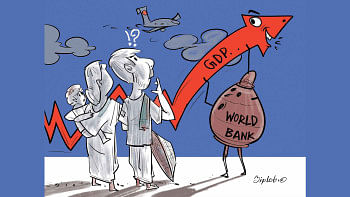
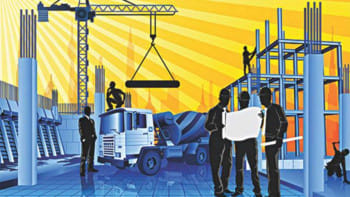



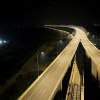

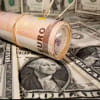



Comments